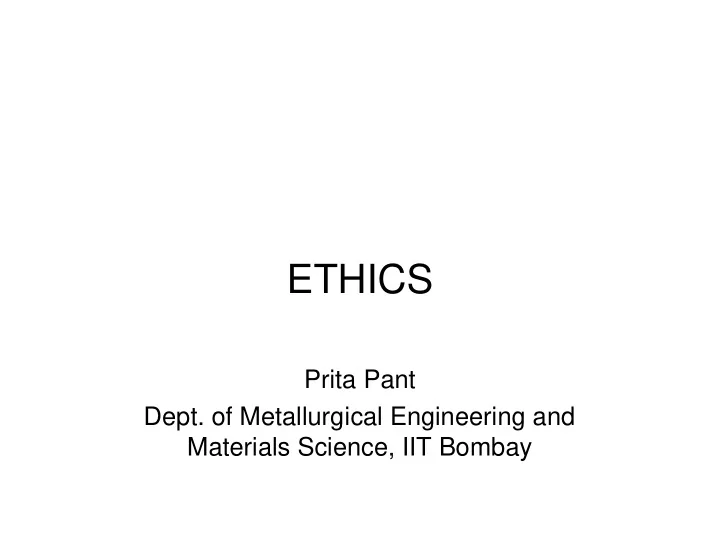

ETHICS Prita Pant Dept. of Metallurgical Engineering and Materials Science, IIT Bombay
Ethics are? • ( used with a singular or plural verb ) a system of moral principles. • the rules of conduct recognized in respect to a particular class of human actions or a particular group, culture, etc.: medical ethics • moral principles, as of an individual: His ethics forbade betrayal of a confidence. • ( usually used with a singular verb ) that branch of philosophy dealing with values relating to human conduct, with respect to the rightness and wrongness of certain actions and to the goodness and badness of the motives and ends of such actions. http://dictionary.reference.com/browse/ethics
Scientific Misconduct in India: Analysis of Retracted Papers in PubMed T. A. Abinandanan Department of Materials Engineering, IISc Bangalore • In November 2010, Steen [1] caused a stir by asserting that “American scientists are significantly more prone to engage in data fabrication or falsification than scientists from other countries.” • Contested strongly by O’Hara [2] who reanalyzed Steen’s data to show that, when scaled by the overall scientific output, the fraud rate for US scientists -- at 4.5 per 100,000 papers -- is quite close to the world average of about 4 papers per 100,000. • O’Hara also showed that the fraud rate is much higher at 18 for Indian scientists. • I focus on 69 papers by Indian authors published during the 10-year period of 2001-2010, only to be retracted later. • Plagiarism the primary mode of misconduct in India. • Of 69 retracted papers, 45 could be traced to some form of scientific misconduct -- plagiarism (of both text and data) and self-plagiarism accounted for 26 and 18, respectively. Only one paper was retracted due to falsification. • At 44 per 100,000 papers [3], the India’s misconduct-related retraction rate is far higher than the world average for all retractions (due to misconduct as well as genuine errors) of about 17.
[1] R.G. Steen, “Retractions in the scientific literature: do authors deliberately commit research fraud?” J. Med. Ethics (2010). doi:10.1136/jme.2010.038125 [2] R. O’Hara, “Rates of scientific fraud retractions” http://blogs.nature.com/boboh/2010/11/17/rates-of- scientific-fraud [3] The difference between Steen’s numbers and mine is due to the classification scheme: I count all plagiarism as ‘misconduct’; Steen counts only data plagiarism as ‘fraud’, and classifies self-plagiarism and text plagiarism as ‘error’.
Relevant to communications course Plagiarism (uncredited use of others' material); self- plagiarism (unacknowledged recycling of one's own material for multiple publications) You are continuing previous students’ project. He has a well- written description of the setup. Since you are using the same setup, it make sense to use the same description? http://www.imsc.res.in/~ethicsmeet/
Data falsification, fabrication, and selective presentation or suppression Postdoc was running some experiments where data had to be collected for 90 min. Observed plateau in data after 30 minutes. Made up the remaining data. Very important to maintain lab notebook so that such observations can be verified. Role of advisors?
• Undeclared conflicts of interest, both in authorship and in reviewing • Inappropriate authorship (non-contributing researchers being given authorship, or contributors being denied authorship) Student A develops a model and graduates after writing first draft of paper. Student B joins, does more analysis and almost re-writes the paper. Who should be first author?
Role of Educational Policies and Social Goals in Promoting Academic Ethics S. R. Hashim former Member Secretary, Planning Commission; former Chairman UPSC There are three elements which an individual weighs against each other and trades off in terms of his own scale of values: • Immediate individual gain from breaking the ethics • Long term social and individual gains in maintaining the ethical practice • Risk of being caught and punished
Immediate individual gain from breaking the ethics • Assignments, exams, projects • Job interview - CV • Bills • Proposal – stolen idea • Papers, reports Do we do it because the risk of being caught and punished is too small?
long term social and individual gains in maintaining the ethical practice • Less policing saves time for more “creative” use of time. • Encourages open exchange of ideas and resources thus encouraging collaborations. • Open notes exams can focus more on testing analytical skills and not memorization. • If students know their rights and responsibilities they will be more confident and more involved members of the academic community.
Recommend
More recommend